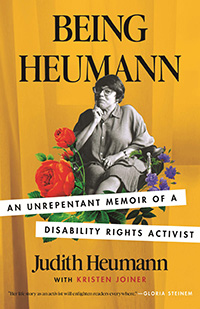 Judith Heumann, Being Heumann: An Unrepentant Memoir of a Disability Rights Activist (Boston: Beacon Press, 2020), 218pp.
Judith Heumann, Being Heumann: An Unrepentant Memoir of a Disability Rights Activist (Boston: Beacon Press, 2020), 218pp.
Judy Heumann (born 1947) might be one of the most important Americans that you've never heard of. I first learned about her in the marvelous documentary film Crip Camp: A Disability Revolution (2020), the last half of which tells the story of the civil rights movement for the 40 million Americans with disabilities, and which was led by the indomitable Heumann. This memoir tells her personal story of having been paralyzed from polio when she was eighteen months old, and her gradual awakening as a leading advocate in the disability rights movement.
Heumann's story is equal parts inspirational and infuriating, as she recounts the daily indignities that disabled people encounter. When she tried to enroll in grade school, she was told that she couldn't because she was a "fire hazard." A sidewalk curb was "like the Great Wall of China." An accessible public bathroom was non-existent. After graduating from college she was denied her teaching credential "because people in wheelchairs can't teach." She appealed to the ACLU but was rebuffed. She sued and eventually reached a settlement with the NYC Board of Education.
Heumann is perhaps most famous for leading the longest takeover of a government building in US history — a sit-in at the Federal Building in San Francisco. Some 150 disabled people occupied the building for 24 days, aided by supporters that included the Black Panthers, the Salvation Army, Glide Memorial Church, the Brick Hut Lesbian Co-op, and 800 people outside. They demanded that Section 504 of the Rehabilitation Act of 1973 be signed immediately and without numerous proposed changes that would have gutted the bill. The regulations were eventually signed by the Carter administration without those changes.
It was still a long, uphill struggle for people who were routinely discriminated against in almost every aspect of ordinary daily life: transportation, education, employment, health care, and even (especially?) simple access. Heumann's biggest triumph was the 1990 signing of the Americans with Disabilities Act by President George Bush, after which she posed a haunting question: "why should I feel fully satisfied just because now I can go to a public bathroom without hindrance?"
The status quo loves to say no, says Heumann. The powerful almost always ignore the weak. Our country owes a debt of gratitude to Heumann and her fellow activists for refusing to accept no for an answer. She went on to serve in the Clinton and Obama administrations, and as the World Bank's first adviser on disability issues. For more on the broader disability movement, see the film Lives Worth Living, which can be watched here (but no where else as far as I can tell):
Dan Clendenin: dan@journeywithjesus.net


